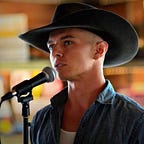Review: The Good Divide
Kali VanBaale
Fiction | Novel
204 pages
5” x 8” Paperback
ISBN 978–1–944850–00–5
First Edition
MG Press
Chicago, Illinois, USA
Available HERE
$15
There’s something stirring in Kali VanBaale’s second novel, something that reaches past the book’s own pages. It’s an effort made by VanBaale and her publishers, MG Press, to go into the rarely-trod territory of the Midwest and to make a literary name for its people. As a Midwestern author myself, (and one with two books from MG Press), I’ve been on the front lines of the movement — but this is the first time I’ve felt a Midwestern book create something so familiar and yet so new. The Good Divide is a disarmingly quiet novel that centers on Jean Krenshaw — a stalwart farmer’s wife on a Wisconsin dairy — as she fights to bury, obliterate, and eventually redeem herself for a family secret. The book is split between two timelines, the 1950s and ’60s, and through these times, we become acquainted with the small cast surrounding Jean, principally Jim, her steadfast and oblivious husband; Tommy, his charming brother; and two of Tommy’s lovers. The cast and plot occasionally mirrors Jane Smiley’s A Thousand Acres — though the reader quickly finds that not only is there a secret or two held in the family, there’s also something deeply wrong with Jean.
Coming from a poor background, with a dead mother and an alcoholic father, Jean has learned to sublimate her plentiful mental anguish for physical pain through whatever blade she has at hand. It’s in these acts, and the slow revelation of Jean’s deeper involvement and guilt in the events of the novel, that VanBaale brings to light the peculiarly Midwestern ethos so rarely made vivid: this is a darkness comparable in stature to Faulkner’s Southern Gothic, in deed if not in word. From late in the book:
Jean vaguely heard Sandy’s plea, muffled by the blood still pounding in her eardrums. The skin on her palms began to burn and yet she kept squeezing, pushing the nails deeper, wanting to break the skin and feel blood. All at once, she smelled her mother, sweeping into the Clermont house wearing her best dress suit after getting caught in a rainstorm […]
This is not Yoknapatawpha County, clearly, but its residents are just as troubled.
Most of the events of the novel take place during small parties; on the 4th of July, Labor Day, all the social gatherings of farming communities — the excuses to let chores go for a few hours. VanBaale manages to braid these numerous parties with Jean’s own origins and the slow revelation of the secret she takes part in, the trouble to come, and the depths of her own issues. It’s difficult to elaborate without giving away too much, and at 200 pages, The Good Divide is a breezy read, but the author is constantly, quietly, building tensions and setting the stage for a final act that falls on the reader in a rush. Some of its parts are predictable, illuminated a little too well, but VanBaale manages, through creating a character with real — and, I think easily underestimated (by the reader) — depth and darkness, a climax that is shockingly human and contrary.
With the depth of Jean, the pleasant ignorance of some characters and the disregard of others, VanBaale has created, in The Good Divide, a novel that takes the central conceit of the Midwest: we’re pleasant, quiet, and we deal with our pain internally and alone — and runs it to the logical conclusion. With the addition of The Good Divide to the American oeuvre, a part of the literary map is made complete.
